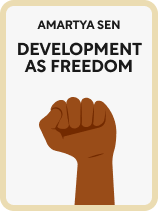

This article is an excerpt from the Shortform book guide to "Development as Freedom" by Amartya Sen. Shortform has the world's best summaries and analyses of books you should be reading.
Like this article? Sign up for a free trial here .
What are ways to increase economic growth? Why is it so difficult for poor economies to develop?
Two of the major reasons underdeveloped countries have poor economies are government intervention in markets and restricted women’s rights. In Development as Freedom, Amartya Sen says that establishing free markets and empowering women are two key ways to increase economic growth.
Read below to learn how to increase economic growth.
1. Establish Free Markets
Markets are integral to Sen’s theory on how to increase economic growth because they afford basic freedoms and spur development. Sen argues that markets have both intrinsic and instrumental value.
Sen identifies two reasons why free markets are integral to his view of development:
1. As a means to economic growth and progress: Sen acknowledges that free markets can increase economic growth and overall economic progress. However, Sen says free markets are much more than just a means to improve prosperity.
2. As a fundamental freedom that people have reason to value: Independent of its impact on economic growth, the freedom to exchange goods and services is a basic part of social interaction and is valuable as its own kind of freedom.
Capitalist Values
Sen also makes a broader point: To increase economic growth, capitalism requires a set of values and norms. A combination of legal institutions and social mores is crucial to economic functioning. We’ll refer to these values as capitalist values, which are part of the ethical guardrails Sen refers to throughout the book, and they help combat greed and corruption.
Trust
The first value, trust, is crucial to economic exchange. Only in a system where mutual trust is routine can trade occur. Part of this trust can be provided by institutional measures, such as contract law, which give confidence to all parties that their agreements will be respected. Another part, however, is more implicit and has to do with the natural cultivation of social norms that give people confidence in the commitments of others.
Sympathy
Sympathy, too, is a capitalist value. Sen agrees with Adam Smith’s view that there are many situations where self-interest compels a person to help others. If we suffer when someone else suffers, this is sympathy. This natural human drive persists even in a capitalist system dominated by self-interest.
Commitment
Sen contrasts sympathy with another capitalist ethic: commitment. Sen defines commitment as a person’s desire to help others, not to alleviate their own “sympathetic suffering,” but from a larger commitment to justice.
These values, Sen believes, allow economic growth to increase, and they provide a means of achieving even more progress. Sen believes these values help explain the sustained success of Western economies, and that cultivating these values in developing nations is crucial to development.
2. Women’s Role in Increasing Economic Growth
Sen identifies bias against women as a major obstacle to economic growth in developing countries. This bias deprives women of basic rights in areas such as political participation and family planning. It harms economic development by failing to tap into the productive capacity of women by excluding them from education and the workforce. By empowering women, Sen argues, not only are women better off, but their communities become safer and more prosperous.
Sen says the fix to gender bias is to improve women’s agency (their ability to make their own decisions in pursuit of their goals).
When women are free to choose whether to pursue an education, enter the workforce, or have children, they usually make choices that benefit not only themselves but their families and communities. This is because they are better equipped than the government to understand the implications of these choices on the people around them. When afforded the same opportunities as men, Sen contends that women become agents of change who can transform communities and societies for the better.

———End of Preview———
Like what you just read? Read the rest of the world's best book summary and analysis of Amartya Sen's "Development as Freedom" at Shortform .
Here's what you'll find in our full Development as Freedom summary :
- The five types of freedom that are integral to economic development
- How democracy can prevent famine
- How empowering women helps communities






